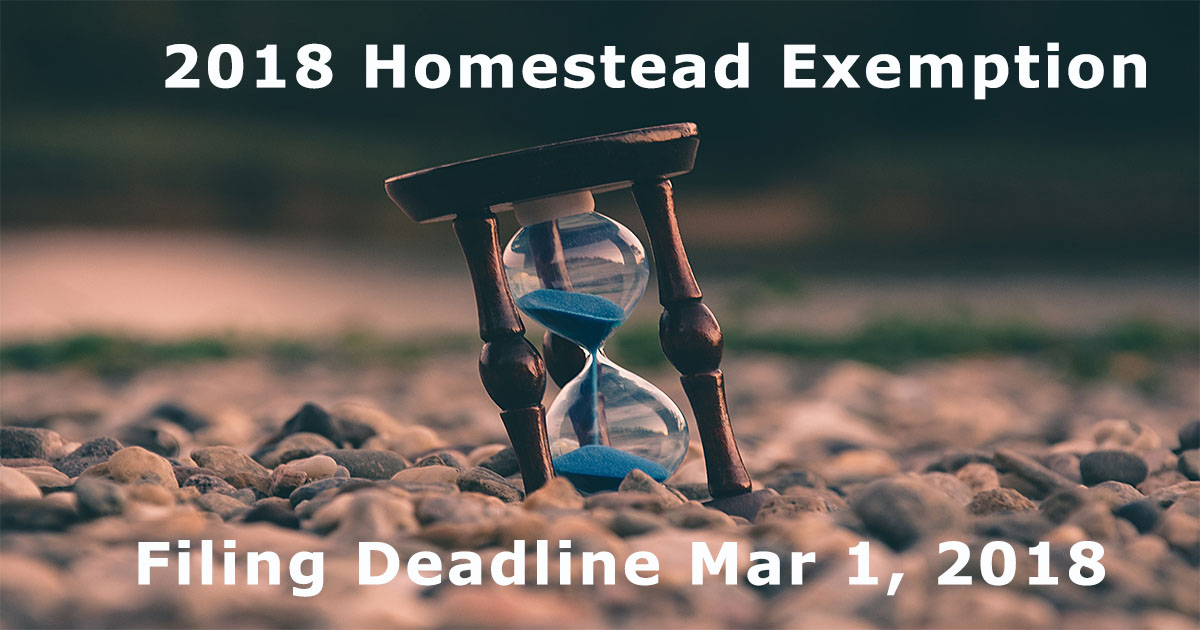
Homestead Exemption Filing Deadline is March 1, 2018
If you purchased a home as your primary residence in 2017, make sure you file for Homestead Exemption. The Florida Constitution allows Florida residents who occupy their home as their permanent primary residence to file a homestead exemption. The homestead exemption exempts or reduces your home’s market value by $25,000.00 based on the county property appraiser’s market valuation. In addition for properties valued over $50,000 can receive an additional $25,000 exemption from all ad valorem taxing authorities EXCEPT school taxes. By reducing your taxable value, you reduce your property tax bill. Everyone that qualifies and files for the homestead exemption will receive provided they file all of the required compliant paperwork.
In addition to homestead exemptions you may be able to qualify for additional exemptions to further reduce your property tax bill. Every exemption you qualify for can be stacked to further reduce your property tax bill provided you can meet the requirements set forth for the exemption(s) requested. The following exemptions are available for those that qualify:
- Active Military (US Military, US Coast Guard, and Florida National Guard) You must file this every you to be considered.
- Florida First Responders – First Responders who became totally and permanently disabled as a result of injuries sustained in the line of duty. First responders are defined as law enforcement officer, correctional officer, firefighter, emergency medical technician, or paramedic. Most importantly the first responder must have been employed by a Florida Agency when the injury occurred.
- Civilian Disability – Civilians who are permanently confined to a wheel chair or are quadriplegic are exempt from ad valorem taxes. Requires two physicians’ certifications. Other deemed disable but mobile may qualify for an additional $500.00 exemption.
- Disabled Veteran – Depending on the severity of the service connected injury that led to the disability Veterans can receive anywhere from an additional $500.00 exemption to total exemption of ad valorem taxes.
- Granny Flats – If you put an addition on your property to accommodate a parent or grandparent over the age of 62.
- Legally Blind – You may qualify for an additional $500.00 exemption
- Portability – This one is a biggie. If you sold a Florida home your previously homesteaded, you can transfer some or all of you r “Save Our Homes” benefit to the new property. Save Our Homes can save you a lot of money on your new home property tax. See Save Our Homes Below.
- Senior Citizen – If you are 65 years of age and older and fall below the income limits you may receive an additional exemption.
- Widow / Widower – Upon presentation of a spouse’s death certificate
Save Our Homes – Homestead Exemption Superboost
In 1994 the State of Florida established a 3% Save Our Homes Cap (SOH) assessment limit on all residential properties that receive a homestead exemption. The 3% SOH Cap limits any increase to the assessed value of a homestead exempt property for tax purposes to a maximum of 3% each year or the amount of the change in the Consumer Price Index, whichever is lower. Properties are assessed at the Fair Market Value when a change of ownership occurs and in the first year it receives the homestead exemption. Once the exemption is applied for, the cap or base year is established, each year thereafter, the SOH cap applies. The 3% SOH Cap remains in effect as long as the property is homestead exempt or until the property is sold. When the Fair Market Value of a property assessed under the 3% SOH Cap drops below the 3% value the property is assessed at the lower of the two. The Taxable Value for a homestead exempt property is the assessed value minus the amount of the exemption or exemptions granted the property owner.
As you can see there are some real savings on your tax bill for filing for homestead; however YOU must file for the exemptions to get them. If you bought your home 2017 or before, you must file for your 2018 homestead exemption no later than March 1, 2018. If you are just filing for the basic homestead exemption, you can file it online. If you are looking to file the regular homestead exemptions AND any other special exemptions, it is best to file in person at the county property appraisers office.
Items Required to File for Homestead Exemption
Whether you are filing online or filing in person you will need the following items:
- Your Recorded Deed (You should have received this in the mail within 2 months of closing). If you can’t find it you can get a copy from Official Records at the courthouse.
- Florida Driver’s license or state id with the address to be homesteaded (For all applicants)
- Florida Vehicle Registration (For All Applicants)
- Palm Beach County Voter ID Card with the Homestead Address for all US Citizen applicants)
- Proof of Permanent Residency (for Non US Citizens)
- Utility bill with your name and the address on it. (Not needed for E-file)
If the above documents have not been updated to reflect address of the property you wish to exempt, that is your first step. Get this done now. As you get closer to the end of February, the lines to file and / update documents get really long so get on it right away.
- Real Estate Market Update - What Mid-Year Indicators Mean for Your Next Move
- Ready to Buy or Sell a Home? Here Are 5 Key Factors in Choosing the Right Agent
- Selling Your Home In 2025? Here’s What Buyers Want (And How To Deliver)
- 5 Roadblocks to Affordable Homeownership And Ways to Move Past Them
- The 2025 Real Estate Report